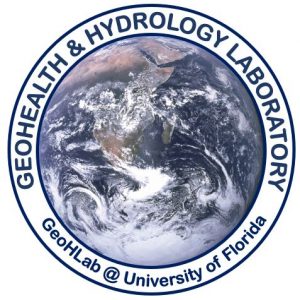Geohealth and Hydrology Research Lab (GeoHlab)
Geohealth and Hydrology Research Lab (or GeoHLab) is an interdisciplinary platform where we view human well-being as one of the key long-term indicators of a sustainable environment. Therefore, sustainability is considered as the ability of a region, thus communities, to endure changes in natural and ecological functions of water. Our research argues that environmental sustainability can be achieved by providing appropriate infrastructure to human population in conjunction with engineering solutions to manage regional surface and ground- water resources (e.g., high or low river flow, moderation of organic matter in water). We specialize in the use of satellite remote sensing data to quantify hydroclimatological and water-ecological processes; develop new algorithms to identify complex spatio-temporal patterns to predict risk of water-related disease(s); and address issues of enhanced climatic variability on emergence of pathogenic niches.
The central theme of our research is to understand role of humans in the hydrological cycle or in other words the coupling of natural and human systems. Within this context, bulk of my recent research has focused on understanding influence of hydroclimatological and environmental processes on abundance and presence of infectious pathogens and thereafter, predicting risk of outbreak of water-related diseases in human population. The ultimate objective is to produce “actionable knowledge” to improve human well-being and provide policy inputs to develop innovative civil infrastructure (under current and changing climatic conditions) that include water distribution, storage, transportation and treatment facilities. The goal is to identify complex feedback loops between natural and human systems to build smart and resilient civil (urban, rural and agricultural) infrastructure.
This research journey started with traditional tenets of hydrology and water resources. My research group has developed hydrological water balance models for understanding partitioning of water in reconstructed watershed in Canada and agricultural regions of Asia. We have developed methods to compute evapotranspiration for all sky conditions in the world. However, for last decade, we are interested to understand complex and complicated interaction of water with humans and to mathematically quantify such interaction that ultimately lead to well-being of humans. Within this context, we have used water and vector-borne diseases as an evaluation metrics to determine need, resilience and redevelopment of civil infrastructure.
The hope is to integrate civil and environmental engineering, water resources, public health, behavioral sociology and microbiology into a cohesive platform for direct and measurable human benefit.
1. Coupled Natural-Human Systems: Water, climate and human health
Hydrology of pathogens and its relationship with human health (Funded research: NASA, NSF, NIH)
Environmental sustainability of civil infrastructure (Funded research: NSF)
Resilience of rural and urban infrastructure to extreme weather events (Funded research: NSF)
2. Remote sensing of hydrological processes (scale issues and prediction of extreme events).
Analysis and remote sensing of hydroclimatological processes (Funded research: USDOT)
3. Sustainability of water resources for food security, human nutrition and water governance
Assessment of resilience of livestock and food transportation infrastructure under extreme natural events (Funded research: USDA)
Explore our research team, their interests and achievements on this website. If you wish to contact us, send us an email (ajutla@ufl.edu)
